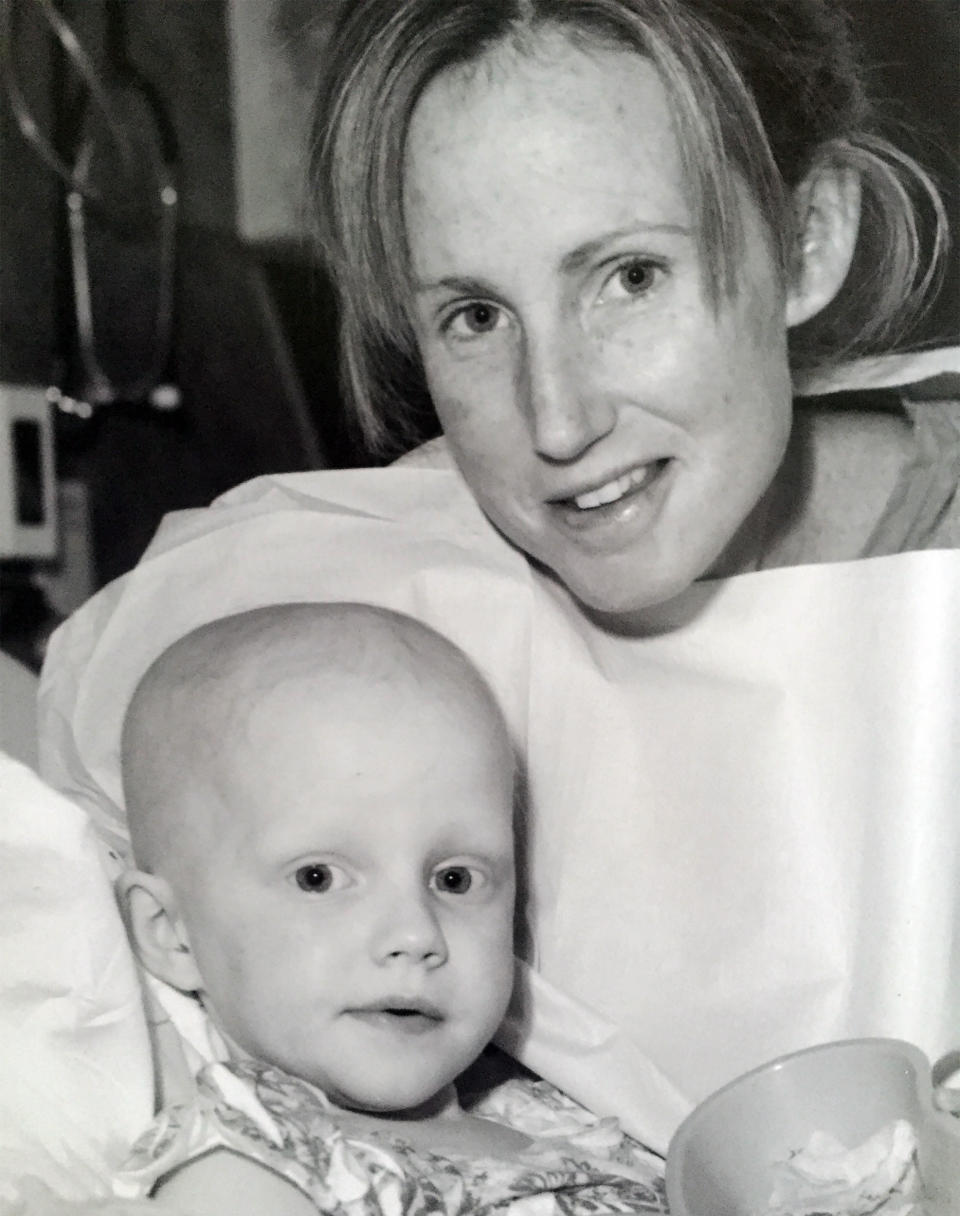My 4-year-old daughter was fighting cancer. I needed Christmas to be perfect
A week before Christmas in 2009, I drove around the TJ Maxx parking lot looking for a spot and asking my husband on the phone about what else I could get for our 4-year-old daughter, who was in the middle of a stem cell transplant to treat stage 4 high-risk cancer.
“She’s so sick, it doesn’t matter what you get her,” he said. “Maybe we shouldn’t even tell her it’s Christmas.” But it did matter. We had a “healthy” 6-year-old daughter, Isabelle, who was counting on Santa. And if Emily didn’t make it, I’d never forgive myself for not giving her a last Christmas.
In a fog of hospital-induced sleep deprivation, I hunted for a Bob the Builder set, Barbies, arts and crafts, Legos, dolls, stuffed animals and fake food. Each gift held the promise of sustaining us through Christmas day or at the very least, offering a solid distraction.

Weeks before, I scrolled through pictures of my girls for a holiday card. I wanted one that didn’t scream cancer and make people cringe, settling on one of them at the beach right before Emily’s surgery in September when she still had a little hair, rosy cheeks and a nasogastric tube.
While I put stamps on over 100 envelopes, I questioned my intention to do it. Was it a way to extend gratitude to the army of people who had dropped off casseroles and driven Isabelle to soccer games? Or was it that a part of me believed that if I didn’t send them, it meant something was really wrong — something I couldn’t fix?
Growing up, I watched my mother orchestrate Christmas. She scurried around for weeks in pursuit of the perfect presents, cards, decorations, teachers’ gifts and eye-catching wrapping paper. Late at night, she poured fudge into tins for neighbors and rearranged ornaments on the tree after we went to bed.
At the end of it all, there was an unwritten guarantee that Christmas would be a success. That narrative was part of my DNA. I dug my heels into my truths as if they could save me from sinking and keep Christmas from being the awful day my gut told me it would be.
An illusion of control made me believe I could control other things, too — like Emily living and dying. Future scenarios played out in my head and crippled my ability to distinguish fact from fiction, safety from danger. Christmas only made it worse.

Most of the time, I knew my thoughts and actions weren’t rational, but the only way to gauge them was to look at other cancer parents, and their behavior was questionable too. Before doctor’s rounds on the 24th, we willed our kids to be “well” enough to go home for 24 hours.
Though I’d never seen Emily sicker, I held out for a Christmas miracle. “We’re so sorry,” her oncologist said. “No kid should have to spend Christmas in the hospital.”
While lucky parents learned how to operate portable hydration backpacks, I wrapped a pile of presents for Emily to open in her hospital bed. The floor’s family specialist had asked me weeks before what gifts Emily wanted. A former cancer family collected donations to fill the kids’ requests. The kind gesture would’ve let me off the hook, but instead, it annoyed me.
It felt risky to leave the details of Emily’s Christmas day to someone else. What if they didn’t do it right? Why could no one understand, if the musts were met, Christmas could be saved?
For years, I helped my mother save Christmas. We searched toy stores for an Alf doll and hard-to-get Transformers for my brothers. Elation and frustration rode between us in her minivan. Her do-or-die mentality sometimes kept us out all night, but we came home successful, relieved knowing Christmas would be OK.
It was a simple formula for Christmas joy. One I wasn’t willing to complicate or change.
On Christmas Eve, my husband stayed with Emily at the hospital. Isabelle and I slept at my parents’ house close by. We put out cookies for Santa and read “The Night Before Christmas.” It was eerie without Emily insisting on eating “one more” cookie and annoying Isabelle with her insistent chatter with each turn of the page.
The next morning, Isabelle went through the motion of opening gifts. “Emily would love this,” she said with each one. Halfway through the pile, she opted to stop and watch cartoons instead. At noon, I headed to the hospital to swap places with my husband.
The pile of unopened presents in the corner of the room looked foolish, a symbol of my attempt to fix the unfixable. Emily’s blood pressure was high. Her eyes fluttered open for a few seconds and then closed. I willed her to wake up, selfishly longing for connection. When she didn’t, I watched “Home Alone” on mute and ate pita chips.
I’d done everything right, and nothing was right.
The angels didn’t sing. Instead, an ache of regret settled in. It took Emily getting cancer for me to realize, truly realize, that the most meaningful part of the day wasn’t a given.
If I couldn’t be with the people I loved, Christmas couldn’t be orchestrated to perfection. It was cliche, so true, so infuriating, and it changed everything.
In the darkness of Emily’s hospital room, a new story began. One in which I accepted my flawed reasoning and missteps with grace and redefined the “musts” of the day. I grasped onto a light of hope that Emily would heal and I’d get to try again.
After 18 months of chemo, radiation and antibody therapy, Emily was cancer-free. The following year I got my chance to redefine Christmas. But I wasn’t sure what that looked like.

I made two “musts.” If it didn’t feel good, I didn’t hold myself to it. And the bigger, more important one: Anything “crucial” would be measured against the four of us spending the day together. Delayed Amazon packages, blurry Christmas cards and burnt fudge no longer held power when compared to Emily in the hospital.
My reform started by not stringing lights outside and handing over Elf on the Shelf duties to my husband, who made us gasp with delight at “Jack’s” adventures. I felt lighter, better.
Inevitably, there were setbacks. I got frustrated when I received a pile of returned Christmas cards that had been sent to old addresses. I panicked, breathed and reminded myself that it was annoying, but not catastrophic. Emily was home.
Our first Christmas post-treatment, my heart nearly burst. It was loud, chaotic and bright — everything I longed for the year before. With the realization that perfection was a myth, I surrendered to the messiness of the day. Every Christmas since, I’ve marveled at how good it feels to leave the urgency and hustle behind.

This year Emily is 17 and Isabelle is 19. They’re normal teenage girls — not saints — who love gifts. I fill virtual carts with Uggs, white Nike sneakers and trendy TikTok makeup. Christmas morning, I love their sleepy smirks at dog pajama pants and seeing the beauty in the tangible. An expression of my love, not a blind act of duty to control the day.
When something shifts out of balance, and it always does around Christmas, I find myself in my bedroom. For a few minutes, I immerse myself in the quiet, dark space of Emily’s hospital room. The memory anchors me to a past that informs the present, and I surrender to a season that holds no promise of perfection, only the guarantee that with the four of us together, we have everything we need.
This article was originally published on TODAY.com

